
Why study Graduate Medicine at Cambridge?
Lucy Cavendish Student, Chris Launchbury, shares his experience of studying Graduate Medicine at Cambridge University.
Lucy Cavendish Student, Tom Carr explains why the Cambridge approach to psychology is so unique (and amazing!).
What made you decide to study Psychological & Behavioural Sciences (PBS)?
Psychology is everywhere, and it affects all of our lives all of the time, every decision we make and every person we interact with. Our brains are so complex and mysterious, and I can’t think of any other degree that would give me the opportunity to explore human experiences in such depth and on such a broad scale. I’ve always been interested in how and why people behave in certain ways, and what these behaviours mean for wider society. Psychology perfectly bridges the gap between science and humanities, so this is a great degree for someone who doesn’t want to stay in one lane, academically speaking!
And why PBS at Cambridge?
The way Cambridge approaches psychology is so unique and incomparable. The structure of the degree means you explore a wide variety of psychological theories, but you also branch out beyond psychology, giving you the tools to make those essential links between how society and human behaviour interact. The range of optional modules you can take each year means I can approach the degree in different ways. From archaeology to sociology, evolution to philosophy. The opportunity to work closely with academics at the top of their field through Cambridge’s supervision system is also incredible, and something you won’t find at many other institutions.
How did you find applying for your course at Cambridge?
Deciding to apply to Cambridge is a scary step to take. You’re very aware of the prestige of the university and the stories that go along with that about the workload, the lack of social life etc… You don’t know whether you’re the kind of student Cambridge wants to take, and you’re reminded of those black and white photos of very serious-looking people in very serious-looking suits. In the end, the application process was hard work, but with a huge payoff! If you love your subject and are passionate about learning, you’re the right student for Cambridge. The interview process especially should be seen as an opportunity to talk candidly about the topics close to your heart with an expert in the field, rather than something to be intimidated by.
What has been great about your course so far?
It’s been amazing discovering new topics that I hadn’t given much thought to before coming to Cambridge, and suddenly becoming totally immersed in them. I knew very little about primates and evolution before Cambridge and now I’m obsessed! It’s been amazing discussing so many different subjects with my peers and academics. I’m not very far into my degree, but we’ve already talked about issues such as schizophrenia, genetics, free will, child development, primatology, and classism.
How have you found the college system?
The college system makes the settling process into uni so much smoother. Having a close-knit, welcoming community of students and staff around you makes Cambridge feel like less of a change from a school environment. Colleges give you the freedom and experiences that any university provides, but also a space for you to feel at home and make friends outside your subject and your accommodation block (a trickier task at universities with no colleges).
What advice would you give to someone thinking of studying PBS?
PBS is brilliant because it combines science and humanities, giving you insight into those all-important links between the two. That’s why I chose it; why limit yourself to only half of academia?! Nevertheless, if you think essays aren’t for you and you’re much more interested in the biological side of psychology, maybe have a look at Biological Natural Sciences as a course option for you. Equally, if you love essays and like the sound of the more sociological side of behaviour, take a look at Human, Social and Political Sciences (HSPS). Both courses offer brilliant psychology papers.
However, if you have your heart set on bringing both worlds together (yay!), get reading! Nothing overcomplicated and boring, start reading about things in psychology you genuinely love the sound of. This will help you get familiar with the literature and topics we explore at uni. Personally, I’ve always been interested in child development, so I read some books about that! Maybe you like the sound of neuroscience, hallucinations or even criminology… psychology is so broad the possibilities are endless!
What are the course requirements?
There are no subject-specific entrance requirements. Due to the strong scientific element, applicants are encouraged to take at least one science or mathematical subject, as well as psychology, at A Level. Mature students and those taking other qualifications are encouraged to contact our Admissions Office, to discuss the entry requirements for their qualifications.
What about the college requirements?
Lucy Cavendish College doesn't require applicants to undertake an admissions assessment for Psychological and Behavioural Sciences. Applicants are required to submit two school/college essays as examples of written work prior to interview. At Lucy, we aim to admit around five students per year.

Lucy Cavendish Student, Chris Launchbury, shares his experience of studying Graduate Medicine at Cambridge University.

Lucy Cavendish Student, Micah Mugge explains why studying Medicine at Cambridge is a fantastic opportunity.

Lucy Cavendish Student reveals why HSPS at Cambridge is such a diverse and exciting course.